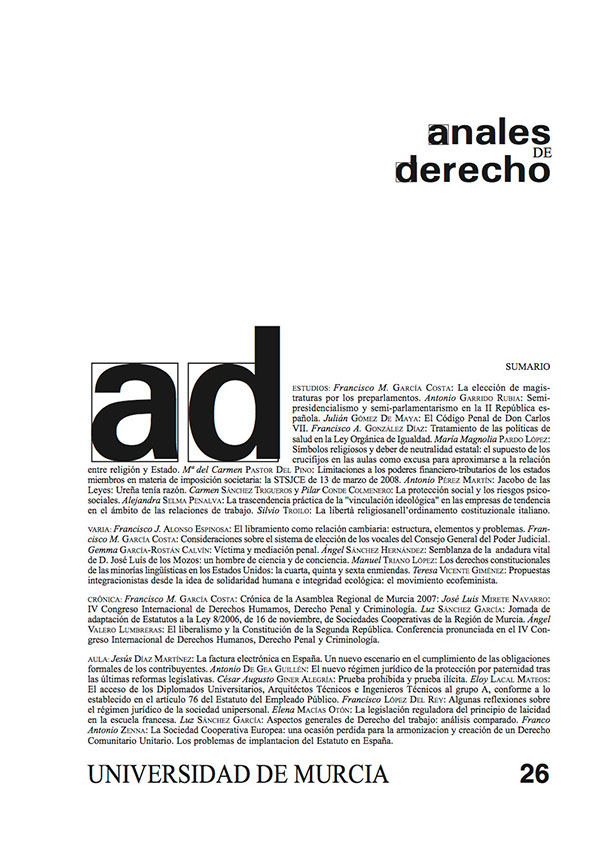Aspectos generales de Derecho del trabajo: análisis comparado
Resumen
The latest regulation about Czech Labour Law took legal force as of 1 January 2007. The Act No. 262/2006, the Labour Code, came and derogated the previous one, that was in use for more than 40 years.
This New Code regulates all the legal relations arising in connection with the performance of dependent work between employees and their employers: ̈labour relations ̈, including in this case also the labour relations of collective nature.
As a fact of being a member of the European Union, this Code implements transpo- sition of the relevant EC Directives, and also regulates some legal relations before the formation of labour relations under. This new regulation gives more freedom to parties in the agreements in labour field.
In the same way, in April 2002, a new Labour Code came into force in the Slovak Republic. The new Code lays down the basic rights and obligations of employers and employees in the business sector, covering matters such as employment rela- tionships, pay, working time and collective labour relations. The aim was to get the requirements of the market economy and balance the interests of employers and employees, while harmonising Slovakian labour legislation with EU law.
In the case of England, the principles that governs the English legal system are stipulated in parliamentary statutes, common law made by judges,conventions and customs. There is no written constitution. The primary sources of law are the law of contract, essentially common law, and statute, of which the Employment Rights Act 1996 and the Trade Union and Labour Relations Act, 1992 are prime components.
A similar situation can be observed in Germany. Although German law belongs to the Continental legal systems and it is mainly based on legislation, some of the most important aspects of collective labour law, are not regulated by statutory law. Bundesarbeitsgericht (the Federal Labor Court) and Bundesverfassungsgericht (the Federal Constitutional Court) filled in the blanks step by step in a variety of decisions. Accordingly, these crucial fields of labor relations are based on mere case law. It turned out to be politically impossible to get trade union law and the law on strike and lock-outs enacted.
In the case of France, it is an industrial economy whose labour laws are designed to protect the interests of employees but also taking account of the economic prio- rities of business. Labour relations in France are governed by labour laws (Code du Travail) and collective agreements for each economic sector of activity.
Finally, talking about Spain, it has a relatively modern constitution and highly regulated labour market. The art. 35 of the Spanish Constitution states that "all Spaniards have the duty to work and the right to work, to the free selection of their profession or office career, to advancement through work and to sufficient remuneration to satisfy their needs and those of their family, while in no case can there be discrimination for reasons of sex". The principal basis for all employment relationships is the Statute of Workers. At the age of 18 a Spanish worker may enter into a binding contract that gives them a wide range of protection including generous compensation for 'objective' dismissal. The main sources in this field are labour law (Statute of Workers), Collective Agreements, and finally private agreements.
Descargas
-
Resumen295
-
PDF3960

Esta obra está bajo una licencia internacional Creative Commons Atribución-NoComercial-SinDerivadas 4.0.
Las obras que se publican en esta revista están sujetas a los siguientes términos:
1. El Servicio de Publicaciones de la Universidad de Murcia (la editorial) conserva los derechos patrimoniales (copyright) de las obras publicadas, y favorece y permite la reutilización de las mismas bajo la licencia de uso indicada en el punto 2.
2. Las obras se publican en la edición electrónica de la revista bajo una licencia Creative Commons Reconocimiento-NoComercial-SinObraDerivada 3.0 España (texto legal). Se pueden copiar, usar, difundir, transmitir y exponer públicamente, siempre que: i) se cite la autoría y la fuente original de su publicación (revista, editorial y URL de la obra); ii) no se usen para fines comerciales; iii) se mencione la existencia y especificaciones de esta licencia de uso.
3. Condiciones de auto-archivo. Se permite y se anima a los autores a difundir electrónicamente las versiones pre-print (versión antes de ser evaluada) y/o post-print (versión evaluada y aceptada para su publicación) de sus obras antes de su publicación, ya que favorece su circulación y difusión más temprana y con ello un posible aumento en su citación y alcance entre la comunidad académica. Color RoMEO: verde.





